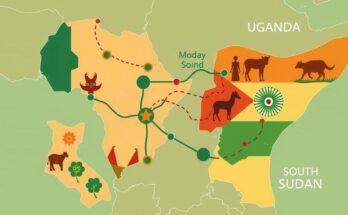Since the beginning of 2023, over 230,000 people have fled violence in eastern Democratic Republic of Congo, marking a severe humanitarian crisis, particularly in the North and South Kivu provinces plagued by conflict with the M23 rebel group. The situation has led to widespread human rights violations and significant internal displacement, prompting a call for urgent international assistance from the UN.
More than 230,000 individuals have fled from escalating violence in eastern Democratic Republic of Congo (DRC) since January, as reported by the United Nations. The situation is considered one of the most alarming humanitarian crises worldwide due to the persistent conflicts that have persisted for three decades in the resource-rich regions of North and South Kivu. The rebel group M23, backed by Rwanda, has become increasingly powerful and has captured significant territory in the region since 2021, including the town of Masisi earlier this month.
UNHCR spokesperson Eujin Byun emphasized the gravity of the situation, noting that escalating confrontations between armed groups and the Congolese military are exacerbating widespread human rights violations and displacing large populations. Currently, 4.6 million displaced people reside in the Kivu provinces, making DRC one of the largest hosts of internally displaced persons globally. Reports from local villagers indicate clashes and explosions from heavy artillery in the area, underscoring the urgent need for humanitarian intervention.
Between January 1 and 6 alone, approximately 150,000 individuals were forced from their homes due to fierce fighting in the Masisi and Lubero territories. Although a temporary ceasefire on January 4 allowed some families to return, renewed hostilities quickly compelled them to flee once again. In Fizi territory, local authorities have requested assistance from international partners, reporting that 84,000 individuals have sought refuge there amidst ongoing violence.
Byun cautioned that civilians are victims of indiscriminate bombings and sexual violence, with children particularly vulnerable. The humanitarian conditions are deteriorating swiftly, and access to the afflicted populations remains hindered by security threats and roadblocks. UNHCR is poised to offer necessary aid once access is secured, but highlighted the pressing need for increased funding; the agency requires $226 million for support efforts in DRC this year, yet has secured less than 10% of that total so far.
The Democratic Republic of Congo has been embroiled in conflict for more than thirty years, particularly in the eastern regions of North and South Kivu, which are rich in natural resources. The emergence of the M23 rebel group has significantly impacted the region, leading to increased violence and instability. As a direct result of this conflict, the humanitarian crisis has intensified, resulting in massive displacement and urgent needs for humanitarian assistance. The UN and other international organizations are striving to address these challenges but face significant obstacles due to ongoing violence and limited resources.
In summary, the alarming increase in violence in eastern DRC has resulted in the displacement of over 230,000 individuals since the beginning of 2023, as reported by the United Nations. The ongoing conflict, particularly involving the M23 rebel group, presents severe humanitarian challenges, including widespread human rights abuses and increased vulnerability among children and civilians. The UNHCR calls for urgent international support and funding to address the dire humanitarian needs in the region.
Original Source: www.france24.com




